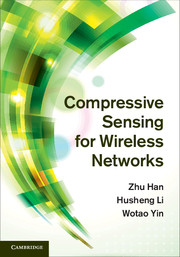7 - Ultra-wideband systems
from Part II - CS-Based Wireless Communication
Published online by Cambridge University Press: 05 June 2013
Summary
Ultra-wideband (UWB) is one of the major breakthroughs in the area of wireless communications, which is highly sparse in the time domain. Hence, it is natural to introduce CS in the design of UWB systems in order to improve the performance of UWB signal acquisition. In this chapter, we will discuss both the compression and reconstruction procedures in UWB systems, which serves as a good tutorial for how to apply CS in communication systems having sparsity. Note that channel estimation is also an important topic in UWB systems. However, since the CS-based channel estimation for general wireless communication systems has been discussed in Chapter 6, we omit the corresponding discussion in this chapter.
A brief introduction to UWB
History and applications
Although it has been studied since the late 1960s [327], the term “ultra-wideband” was not applied until around 1989. A major breakthrough of UWB was the invention of micropower impulse radar (MIR) that, for the first time, operated UWB signals at extremely low power and inexpensive hardware. According to the wide applications of UWB, the Federal Communications Commission (FCC) in the United States authorized the unlicensed use of UWB in the spectrum band of 3.1 GHz to 10.6 GHz in a report and order issued on February 14, 2002. The more detailed history of UWB can be found in [328].
- Type
- Chapter
- Information
- Compressive Sensing for Wireless Networks , pp. 173 - 192Publisher: Cambridge University PressPrint publication year: 2013



